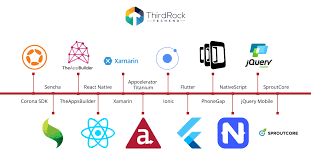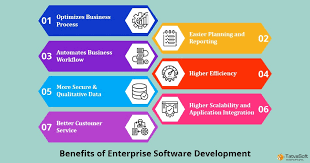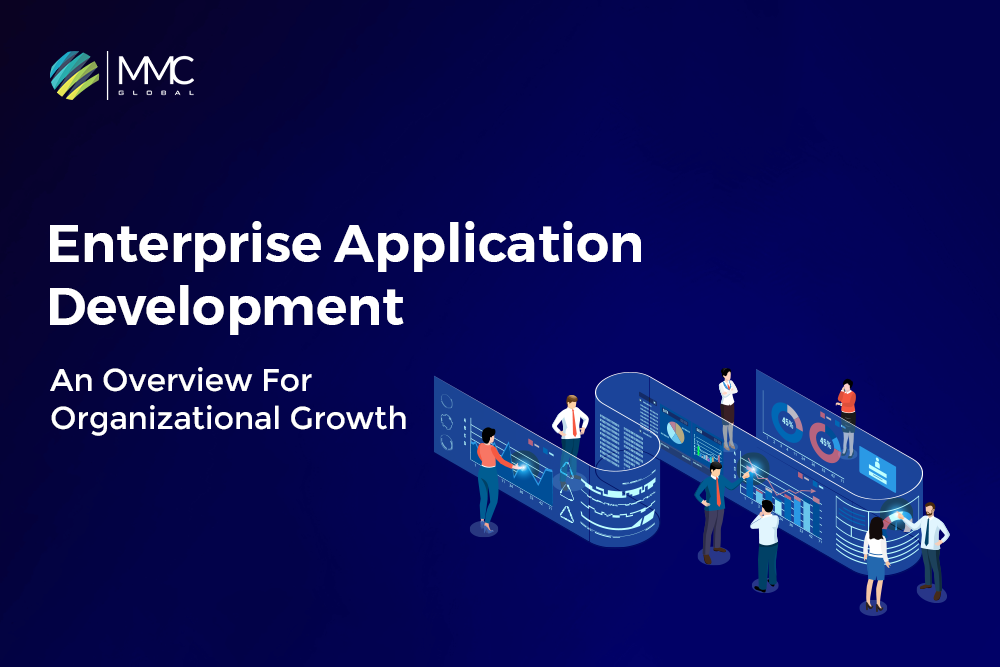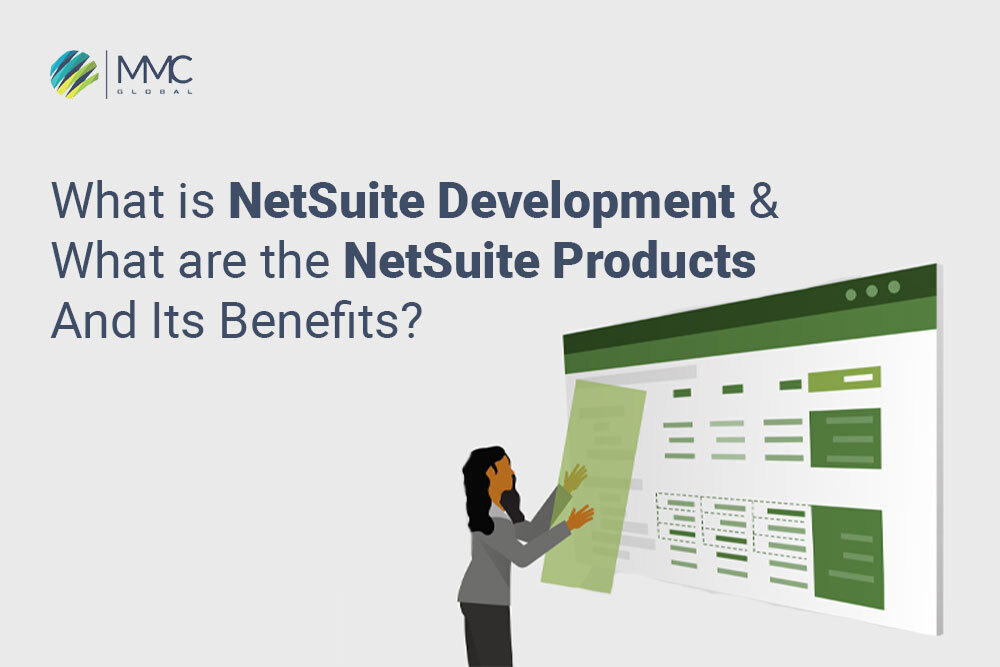Enterprise app development frameworks are crucial tools for software developers. They hand over a structure for establishing software and ensure the code is drafted correctly. In this blog, you will learn many core aspects of app development, its importance, characteristics of frameworks, advantages and disadvantages, and much more.
First, understand the real meaning of enterprise app development frameworks in simple words to understand the topic well.
Read more: Mobile App Development Frameworks That Help Business Growth in 2022
What does App Development Framework Do?
An app development framework is a software library that caters to an elementary structure to support the development of an app for specific terrain. An app development framework acts as fragmentary support to make an app.
The main objective of designing an operation framework is to diminish the common issues faced during the development of an application. This is accomplished through the use of code that can be joined across different modules of an operation. Enterprise app development frameworks can be used in graphical user interface (GUI) development and in other areas like web-based operations.

The app framework is not an idea that is recently arrived. Some enterprise app development frameworks were completed in old times but are still in use today, such as the Smalltalk user interface, Struts (a web-based Java application), and MacApp (for Macintosh).
What Are The Best Enterprise App Development Framework?
In this modern era, enterprise app development frameworks cater to built-in benefits such as efficiency, speed, and a bug-free environment. The application framework uses pre-built components, including compilers, tool kits, and debugging tools, to present the application framework on the destined devices using the enterprise code.
Using the skills of an expert of a reputable enterprise app development company may help the enterprise to create a reactive and quick application and administer excellent user interactions. Using enterprise app development frameworks helps speed up and streamline the application development process.
Like MMCGBL provides high-end enterprise app development services to any type of industry. We have professional and expert developers that assist any kind of project as per the requirement of the clients. We have proof that showcases our potentialities and proficiency that helps to grow in small to large enterprises.
With the ambition to create GUIs in an application with less development exercise, application frameworks validate to be a powerful solution by catering to a standard framework with a basic pre-defined code structure. Microsoft Foundation Classes is an application framework operated in the Windows atmosphere to develop applications in C++ language. Microsoft Foundation Classes has entire tools for automatic code generation for the GUIs controls enclosed by the framework.
A good enterprise app development framework works as a tool to furnish the template and structure to build an application.
Types of Enterprise App Development Frameworks
Windows, iOS, and Android are some of the few automated devices available. Enterprise app development frameworks come in a mixture of shapes and different sizes. We’re not speaking about particular app areas like purchasing or games. Still, mobile apps and systems may be divided into three groups in terms of how operations work on a smartphone.
Native Applications
Native applications are mainly designed for iOS, Windows, and Android operating systems. The applications help use the device features like GPS, Camera, RAM, etc.
Web Applications
Web applications are software located at a distance and will be dispersed via the web using a browser interface. It includes auction sites, weblogs, online shopping sales, instant messaging apps, emails, and other trendy web applications.
Hybrid Applications
These hybrid applications are launched on systems, mobiles, tablets, etc., in the same manner, other applications are being launched. The element that makes hybrid applications different is that hybrid apps have some blend of components from the web and native applications.
The acknowledged frameworks are mainly used to construct these applications.
- Native Application Framework
- Hybrid Application Framework
The native applications are one of the best quality applications in both aspects of functionality and aesthetics.
Moreover, the native app development framework is relatively more expensive than the others. Besides, accomplishing the maximum number of visitor engagements can be difficult because of the availability of numerous platforms and devices.
When the primary target is financial constraints and a massive number of visitors, an application development enterprise should opt for a hybrid application or go for cross-platform app development technology.
Read More: Hybrid App Development – 10 Best Frameworks Everyone Should Know
Benefits Of Using Enterprise App Development Frameworks
Enterprise application development frameworks cater to multiple benefits for software developers. These favours include painless development, compatibility, maintenance, standardization, better security plan, elevated productivity, and effortless collaboration. Employees can improve their work quality and speed using enterprise app development frameworks.

Though, they can still diminish the period and effort that is required. Below are some benefits of using an enterprise app development framework:
Enhanced Security
The application development framework software administers a bunch of standardized tools and systems, which can be used for better security of application development software. The application framework integrates the process of justifying input data, collaborating with other systems, and authorizing access controls. They also cooperate in minimizing common vulnerabilities like cross-site scripting and SQL injection.
Accessible Development And Maintenance
The application development frameworks have made it accessible for developers to manufacture and maintain the application development software. The application development frameworks cater to a stabilized, clear-cut and transparent structure for the application; moreover, it has libraries of reclaimable code that can be handled to accelerate development.
Effortless Collaboration
The enterprise app development framework has made it simpler for the developers to collaborate on the program. The application frameworks cater to several sets of tools and processes that all members of the development team use. Additionally, various application frameworks are inclusive in supporting version control, which can aid the developers in tracking the changes and effective collaboration.
Application Standardization And Compatibility
Application development framework software help in standardizing software development among different organizations. Application frameworks administer many tools and processes that developers can access, no matter which company or project they belong to. Additionally, the application development frameworks are primarily compatible with various programming languages, which makes it easier for the developers to swap between projects.
Towering Productivity
The application development framework software can help multiply the developer’s productivity by catering to them with a collection of the most acceptable practices and reclaimable code. This support the developers to target the particular task needed of the hour rather than constructing basic functionality from the start. Furthermore, application development frameworks are mainly used to engender code skeletons that can help raise productivity.
Advantages Of Practicing Enterprise App Development Frameworks
There are enormous advantages to applying enterprise app development frameworks. Some of the prominent advantages are as follows:
Reusable Code
The fundamental advantage of applying application development frameworks is that the code is reusable. This will help the developers to save a lot of time, and they don’t have to start writing the code from scratch every time. For instance, if there are so many applications and you are constantly using a function, it would be better to include your application framework. In this way, you only have to pen it down once.
Code Consistency
The same code will be constantly used whenever you use a similar connection configuration or string file. This will help in minimizing errors and saves a lot of time.
Heightened Level Of Productivity
The application frameworks provide you with the first crack on your development. They mostly give you leverage to write correct and maintainable code, which will help you be extra productive in the long run. Well, this doesn’t mean that application frameworks are always the best operating option.
Behavioral Consistency
Using the application development framework helps in delivering more consistency to your code-base as to other classes and functions that are constructed for you. For instance, with ASP.NET MVC, you will get a helper class of HTML that is immediately wired up to the entire suitable events.
Disadvantages Of Practicing Enterprise App Development Frameworks
Everything that we use comes with pros and cons, and there is nothing that has only advantages. For enterprise app development frameworks, there are also some disadvantages that are mentioned below:
Rise In Learning Curves
Whenever you use a contemporary framework, there will be room for a learning curve where you need to be more careful; otherwise, you will end up investing more time in gathering knowledge of that framework instead, you would have penned down your own code from the beginning.
Elevated Complexity
On any occasion when we start to use a new thing, that will create some uninvited problems for us. Thus, a higher complexity framework will create serious difficulty in learning and using the framework. This might build up frustration and can cause a waste of time as well.
Restricted
Even though the main concern of application development frameworks is to recover some time and deliver a better foundation, selecting the wrong application framework for your project can also fire you back. It can create hurdles and restrict you from practising the framework or making any alterations to the code. So, it is better to oversee what the framework offers you and whether it matches your program. Otherwise, picking the wrong framework could be more damaging for time and cost you more for the project.
Constrained Flexibility
If you are choosing a pre-defined framework, you should remember that it is less flexible than custom code. This can make it burdensome to solve exclusive pr edge cases. You must be very careful while choosing the framework because if the framework mould is not suitable for your project, then this can be an extensive problem for the whole program.
Marked-up Dependency On Third Party Library
Application frameworks are dependent on the third-party library for all the heavy-lifting parts of the program. For all the new features apps, the third part libraries must be up-to-date. If these new features are not available there, then it would be a massive problem for your project.
Which Enterprise App Development Framework Is Perfect For Your Project?
When it comes to application development software, various frameworks are ready for use, and you only need to pick from them. It doesn’t seem like it, but it could be a challenging task to decide which one would be perfect for your project.
Now, let’s directly dig into how to choose the perfect application development framework for your project:
First of all, you need to examine which framework language you want for the project. You should select Python, Ruby, or Java if there is no preferred language. Moreover, it would be best if you recognized whether the preferred framework is open-source or not. If the framework is open-source, there will be a high chance that other people are also using it and modifying the code more intermittently. On the contrary, an open-source application framework possibly has some hidden features because of patents that can leverage your final decision.
Moreover, you must acknowledge if the application framework has a favorable community base. This means that you need to see a bunch of tutorials and expert people who have knowledge in this field. Perhaps it could be challenging for you to find aid when necessary during the ongoing application development process. Furthermore, you need to analyze if the framework is mature enough and the size of the community base. So you would know that it has been operating for a while and other people have used it, and possibly, you can get the feedback as well.
To be fully insured, what type of application framework procedure would be perfect for your project? You can look up some case studies and some example applications. This way, you can get an idea of how the framework operates and what you should expect from it.
Ultimately, the perfect way to choose the application framework would be to try it out yourself, only if you have that much time or a trusted person who can help you in this matter and try it for you. This will enable you to have an improved understanding of how it works and if it is a correct application framework for your project or not. If it is not the right one, then you can switch to another one.
List Of Prominent Enterprise App Development Frameworks
As we have discussed earlier, there is a pool of amazing application development frameworks out there, and all of them have some advantages and disadvantages. So, it is a challenging task to decide which application framework works perfectly for your project.
Listing down some of the popular application development frameworks in 2022, so you can look them up and decide the best one for your project:
- TurboGears (Python)
- Django (Python)
- PyTorch (Python)
- Flask (Python)
- Ruby on rails (Ruby)
- Spring (Java)
- Spark (Java)
- Garden (Ruby)
- Play (Java)
- Javalin (Java)
- Netty (Java)
- Wicket (Java)
- Laravel (PHP)
- Symfony (PHP)
- Reactor (Java)
- Neural Network Libraries (Java)
- CakePHP (PHP)
- ReactJS (JavaScript)
- AngularJS (JavaScript)
- Nuxt,js (Vue.js)
- Phoenix (Elixir)
- Aeron (C++)
- Apache MXNet (C++)
- Core Data (Objective-C)
- Xamarin (C#)
- Infer.Net (C#)
- Express (Node.js)
- Grails (Groovy)
- Yesod (Haskell)
- Caliburn Micro (CSharp)
- Pidgin (CSharp)
- Framework7 (HTML5)
- Flutter (Dart)
- Ionic (CSS, HTML, JavaScript)
- Mojito (Node.js, C++)
End Notes
After seeing a lot of enterprise app development frameworks, we have come up with the best application frameworks mentioned in this blog which will help you select the perfect framework for your project. Well, as time passes, new frameworks will alter businesses.
In this blog, you have come to know that selecting the correct application framework from a bunch of available frameworks for constructing an enterprise application is not just about spending time on the internet and look-up at “top most enterprise app development frameworks” and selecting the favored results.
It is about getting the accurate mix of components, applicable range, speed development and flexibility, and its management with maintenance. Once you get the crux, you can select the perfect framework for your project.
If you are in search of integrating your enterprise and operations with the applications, then we will be able to help you with your strategic and app constructing needs. Get the result-driven enterprise app development services that lead you to your company goals.
FAQs Related To Enterprise App Development
What kind of failure make the enterprise app development frameworks switch to a private cloud?
- The elevation of the application as SaaS
- Storage elasticity of the application
- The application’s performance benchmark
- Contactless maintenance for the application
What is the elementary obligation to operate any cloud application?
A cloud application caterer must provide top-class security and information privacy advanced than its users can do on their own and at no further cost. Policies and procedures should incorporate application, physical, data-level security, network, disaster recovery, and full data back-up.
How much time is needed for cloud migration?
At a rough rate, a medium size project that includes migrating email and document management can take around 2 to 4 months of period. It will take approximately 6 to 24 months to assemble different complex setups and configure the cloud-native services. Enterprises migrate to the cloud at various rates.


